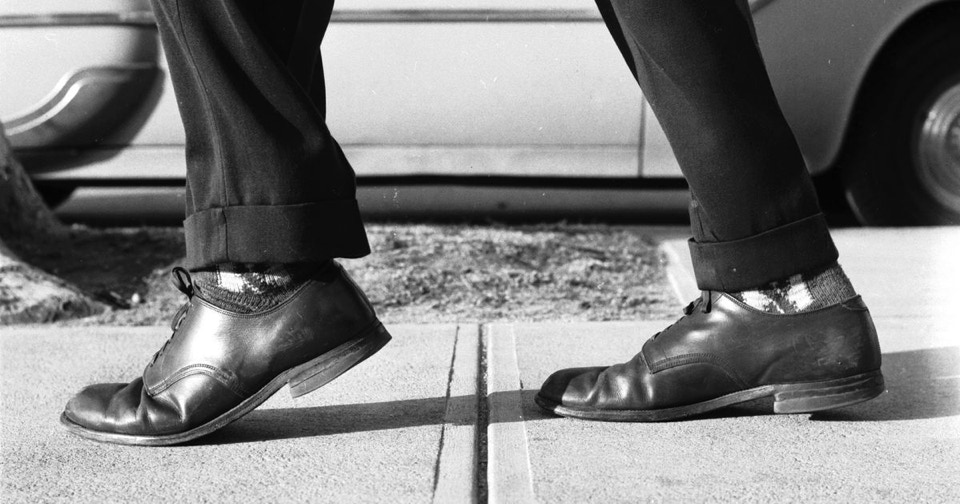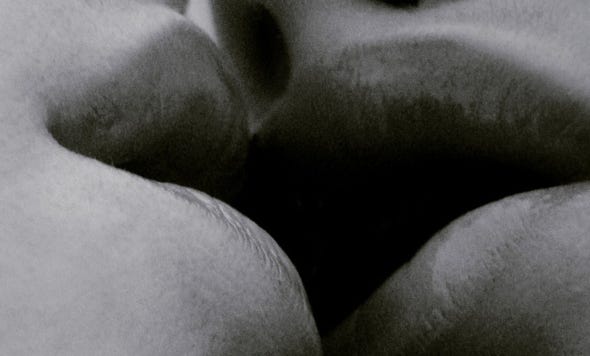Out of thought came the word
“People Are Crossing The Road To Avoid Me From 100m Away.” How Covid-19 & Social Distancing Has Changed Walking
Thanks to the coronavirus, social distancing has changed the way we walk, with people swerving desperately around each other or stepping into the road to avoid proximity. By Ben Arogundade. June 24, 2020.

URBAN AVOIDANCE: The coronavirus lockdown and social distancing rules have altered the way we walk, as we try desperately to avoid proximity to others as we walk along our streets.
REAL PANDEMICS DON’T look like they do in movies like ‘Contagion’. There is no mass hysteria, no people screaming in the streets, no burned out cars or mile-long traffic jams of people desperately trying to get out of town. Real pandemics happen quietly. Britain under lockdown is a calm and peaceful place. The sun is out, the trees are blossoming, cars are passing, children are playing, people are riding bicycles and couples are holding hands. The pandemic happens away from our eyes — in hospitals, care homes, morgues and on the television news.
The visual signs of disruption are palpable in the closed shops, in the worried expressions on people’s faces, and in the quickness of their footsteps through the supermarket aisles. This is perhaps the most obvious sign of the presence of a pandemic — when people start walking differently. Physical distancing has radically changed the way we move. Once set at two metres, and now reduced to one, this measurement continues to define our personal space, and its radius has taken on an almost energetic form, like a force field around us. Whenever anyone encroaches, an alarm quietly goes off within us.
HUMAN DISTANCE
This has spawned an entirely new mode of behaviour, and one that has taken us completely by surprise. To suddenly not be able to touch, to hug, to feel skin or even to stand next to each other is shocking. It is like taking a restraining order out on oneself — the most extreme kind imaginable. This is the loneliest, most isolated that any human being can be, outside of prison. The poet John Donne famously wrote that “no man is an island” — well now, physically at least, we all are.
In no time at all this has altered street life, and the way we now navigate the city. Being out in the street has become almost dangerous — because out there is where the virus is, in the bodies of strangers — and the mere sight of another human being approaching us is enough to fill us with a deep sense of apprehension. Are they infected? Within our freaked out state of hyper-vigilance, everybody — strangers, friends and family alike — is now is a potential enemy, a repository of sickness and potentially death.
INTO THE ROAD
As a result, the pavement has now become an obstacle course. The directive for us all to stay at least one metre apart is challenging in an environment in which two-thirds of London’s pavements are very narrow, and many contain trees or other objects that narrow them intermittently. But the biggest obstacles are the human beings walking towards you. The desire to find space away from others means that the road has become the new pavement. Both vistas have merged into a single, wide thoroughfare. But this is no pedestrian paradise — there are still cars — so we now risk being run over as well as potentially contracting Covid-19. Double trouble.
Road walking has become part of a new urban etiquette. So much so that in Manhattan the authorities have even closed some streets, including a section of Park Avenue, to give pedestrians more space to walk in a state of separation. Under lockdown the biggest decision we have to make whenever we emerge from our homes is, when or if we should step into the road to avoid someone coming towards us. This decision can be based on a number of factors, such as how narrow the pavement is, or how afraid you are about being in a stranger’s proximity. A lot of the time I have been “forced” into the road by inconsiderate pavement users (IPUs) — in other words, those who take up the entire width of the thoroughfare. Last week I encountered a couple who appeared to be on a date, and who were strolling at opposite edges of the pavement in order to maintain distance. As I approached them I had to decide whether to walk through the centre of them (at less than the designated distance), or step into the road. I chose the road, but I cursed them under my breath as I passed, for their selfish breach of the new pavement etiquette — which is to drop into single file directly behind each other, allowing others to pass on the opposite edge.
COVID-19s IPUs
In fact, ever since lockdown I have found myself secretly cursing a lot of different IPUs I have come across whenever I have ventured out. Here is my list of the top offenders:
Family of four taking up the whole width, with kids on scooters.
Parent with double-width pram, strolling with friend.
Two friends social distancing from opposite sides of the pavement.
Groups of runners.
Groups engrossed in narcissistic chatter, oblivious to the world.
Person with dog on a long lead stretching the width of the pavement.
Man hosing down the pavement in front of his house.
Mobile phone zombie with face buried in screen, who does not see you until the last moment.
Someone standing right in the middle of a narrow stretch of pavement.
These IPUs will often not think about moving aside until the very last moment, by which time I have already made my move into the road. Over time I have felt myself becoming increasingly fed up with being the one that always ends up swerving into the road and risking sudden death, and so now I have started to hold my ground on the pavement, in a kind of bizarre Mexican stand-off with oncoming IPUs. As I walk toward them now, in my head I am saying. “I’m not moving, I’m not moving, you move, you move, YOU MOVE!”
SUPER DISTANCING
Conversely, many people are happy to step into the road to avoid oncoming humans, because they are super distancing — in other words, separating by more than the recommended measurement, just to be extra safe. In a supermarket recently a man backed away from me even though we were already ten-metres apart. On another occasion a woman I was about to pass on the street, in an attempt to avoid me, threw herself back against a shop-front window, as if she wanted to be sucked through the glass, even though there was a very respectable three-metre gap between us. Super distancing on long streets is the most bizarre occurrence. As I walk I now regularly see people crossing the road to avoid me from 100 metres away. As a black man, on many occasions in my younger years I experienced what it was like to see people cross the road like this, or for taxis not to stop for me when hailed. Many bearded Muslims also went through similar experiences in the period after 9/11 and also the 7/7 bombings here in the UK. At the start of the pandemic, as news that the virus came from China began to circulate, East Asians living in the US and Europe were also discriminated against.
Simultaneously, I am filled with joy and gratitude whenever fellow pedestrians behave kindly towards me on the streets of London. I remember stepping into the road to give space to an elderly woman and her dog on a narrow stretch of pavement, and she looked me in the eye as I passed, smiled and thanked me for my gesture. I stopped and we struck up a brief conversation before we went our separate ways. It was a lovely interaction at a time when many people like me are locked down alone in their apartments. Every human connection has become like gold. This experience led me change my mind about my feelings of resentment about being the one who always steps into the road to let others pass. I came to the conclusion that it was better to be generous than belligerent.
KEEP ON MOVING
Another new rule for streets is that people should be constantly moving — walking or running — but not standing still — because to stand still risks someone coming up behind you and “encroaching”. Recently I was walking behind a woman with an infant in a pram, when she stopped abruptly to tend to her baby. In no time I had caught up with her. Suddenly I was in “her space”, and she swivelled and glared at me, as if I had done something wrong. For a few moments I actually felt guilty, like some kind of burglar, stealing her space.
Street corners can also be awkward. Early one morning I was out running when I came around a corner and bumped into another runner. Our bodies touched — physical distance suddenly breached — my heavy breathing projecting towards her heavy breathing. Alert, alert! In that split second there was a panicky foot shuffle and body swerve, almost like a dance, a kind of Covid-meringue. Amazingly we both saw the comedy within the accident, and we laughed and went our separate ways. This simple exchange reinforced the importance of retaining a sense of humour in these difficult times.
The weather in the UK has been good for most of the lockdown, but I was grateful for the rain that fell at end of April. It meant that the streets were even more deserted, and I walked around freely, hardly dodging anyone, and for those hours walking was suddenly back to normal. It felt so special, moving unselfconsciously through the shiny wet streets. It was just like the old days when walking was walking.
CORONAVIRUS & BLACK LIVES MATTER
Recent events have shown that there are circumstances in which people are willing to defy the new rules for how we walk. The recent Black Lives Matter protests sparked by the brutal murder of African American George Floyd by a white police office in Minneapolis, saw thousands breach the guidelines at the ensuing protest marches and demonstrations across the world, despite government pleas to do the contrary. For those marching, protesting against racism and police brutality meant more than staying safe from Covid-19.
Under lockdown, the one place where we can enjoy the greatest freedom to move is parks, which partly explains their explosion in popularity during lockdown. In London’s Hyde Park, close to where I live, attempts to avoid proximity to others has resulted in people veering off the designated hard-paved paths, randomly turning onto the grass instead, and carving out their own bespoke routes in the expanse. Venturing inland like this is always a good idea, as it has the added benefit of bringing people closer to trees and shrubs.
Ultimately, being forced “off course” in the streets and parks of our cities offers a powerful metaphor for each of us to change something within our lives, to stop following the same tired old routes we did before Covid-19. While the indications are that some form of social distancing will continue for some time yet, there is also hope that being forced apart from our fellow humans will, once we have come through the other side of the pandemic, make us desperate for human connection, enhancing our desire to connect, to kiss, hug and touch with a new enthusiasm and vibrancy. Being apart should teach us how to be together.
Ben Arogundade’s new book about online dating is out now. Available now at Amazon, (£9.99/$12.99)
My Terrifying,
Shocking, Humiliating,
Amazing Adventures
In Online Dating, by
Ben Arogundade



